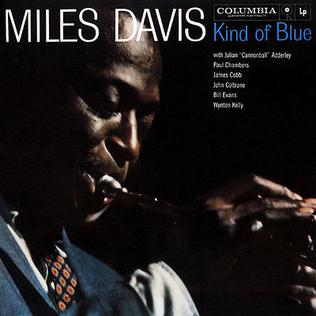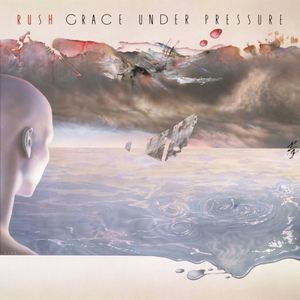In music, ornaments or embellishments are musical flourishes—typically, added notes—that are not essential to carry the overall line of the melody, but serve instead to decorate or "ornament" that line, provide added interest and variety, and give the performer the opportunity to add expressiveness to a song or piece. Many ornaments are performed as "fast notes" around a central, main note.

Jeffrey Scott Buckley, raised as Scott Moorhead, was an American singer, songwriter and guitarist. After a decade as a session guitarist in Los Angeles, Buckley amassed a following in the early 1990s by playing cover songs at venues in Manhattan's East Village, such as Sin-é, gradually focusing more on his own material. After rebuffing much interest from record labels and his father Tim Buckley's manager Herb Cohen, he signed with Columbia, recruited a band, and recorded what would be his only studio album, Grace, in 1994.

Kind of Blue is a studio album by American jazz trumpeter Miles Davis. It was recorded on March 2 and April 22, 1959, at Columbia's 30th Street Studio in New York City, and released on August 17 of that year by Columbia Records. The album features Davis' ensemble sextet consisting of saxophonists John Coltrane and Julian "Cannonball" Adderley, pianist Wynton Kelly, bassist Paul Chambers, and drummer Jimmy Cobb, with former band pianist Bill Evans appearing on most of the tracks in place of Kelly. In part owing to Evans joining the sextet during 1958, Davis followed up on the modal experimentation of Milestones by basing Kind of Blue entirely on modality, departing further from his earlier work's hard bop style of jazz.

Grace Under Pressure is the tenth studio album by Canadian rock band Rush, released in April 1984 on Anthem Records. After touring for the band's previous album, Signals (1982), had come to an end in mid-1983, Rush started work on a follow-up in August. The band had decided to not work with its longtime producer Terry Brown, who had worked with Rush since 1975. The new material continued the group's change in direction towards a keyboard-oriented sound as per the previous two albums. After some difficulty in finding a suitable a producer who could commit, the album was recorded with Peter Henderson.

Three Days Grace is a Canadian rock band formed in Norwood, Ontario in 1997. Based in Toronto, the band's original line-up consisted of guitarist and lead vocalist Adam Gontier, drummer and backing vocalist Neil Sanderson, and bassist Brad Walst. In 2003, Barry Stock was recruited as the band's lead guitarist, making them a four-member band. In 2013, Gontier left the band and was replaced by My Darkest Days' vocalist Matt Walst, who is also the younger brother of bassist Brad Walst.

1. Outside is the nineteenth studio album by English recording artist David Bowie, released on 25 September 1995 by Arista Records. It marked Bowie's reunion with Brian Eno, whom he had worked with among others on his Berlin Trilogy in the 1970s. Outside centres on the characters of a dystopian world on the eve of the 21st century. The album put Bowie back into the mainstream scene of rock music with its singles "The Hearts Filthy Lesson", "Strangers When We Meet", and "Hallo Spaceboy".

Quintessential Player was a freeware, multi-format media player developed by Paul Quinn.
Canntaireachd is the ancient Scottish Highland method of notating Piobaireachd, also spelt Pibroch, referred to more generally as Ceol Mòr, an art music genre primarily played on the Great Highland Bagpipes. These long and complex theme and variation tunes were traditionally transmitted orally by a combination of definite vocable syllables. In general, the vowels represent the notes, and consonants the grace notes, but this is not always the case, as the system has inconsistencies and was not fully standardized.
This article defines a number of terms that are exclusive, or whose meaning is exclusive, to piping and pipers.

Times of Grace is the sixth studio album by Californian band Neurosis, released on May 4, 1999. It continued the band's development of the post-metal genre and demonstrates gothic rock and progressive rock influences. This album and Grace, an ambient companion by the band's alter-ego Tribes of Neurot, are designed to play alongside each other. Times of Grace marked the beginning of the band's ongoing working relationship with recording engineer Steve Albini.

TrackID was a mobile music and audio search engine for Android devices and some Sony television sets. TrackID was developed by Sony Mobile and allowed users to identify music using Gracenote's music database. Gracenote was acquired by Sony in 2008. The acquisition was completed on June 2, 2008. The revised Android application was released in March 2015.

The slide is a musical ornament often found in baroque musical works, but used during many different periods. It instructs the performer to begin two or three scale steps below the marked note and "slide" upward—that is, move stepwise diatonically between the initial and final notes. Though less frequently found, the slide can also be performed in a descending fashion.
CDDB, short for Compact Disc Database, is a database for software applications to look up audio CD information over the Internet. This is performed by a client which calculates a (nearly) unique disc ID and then queries the database. As a result, the client is able to display the artist name, CD title, track list and some additional information. CDDB is a licensed trademark of Gracenote, Inc.
MetroLyrics is a lyrics-dedicated website, founded in December 2002. The MetroLyrics database contains over 1 million songs performed by over 16,000 artists.
Music information company Gracenote changed its database terms to closed-source in 2001. This caused some controversy because Gracenote's ancestor, CDDB, had previously said its database was released under the GPL.









